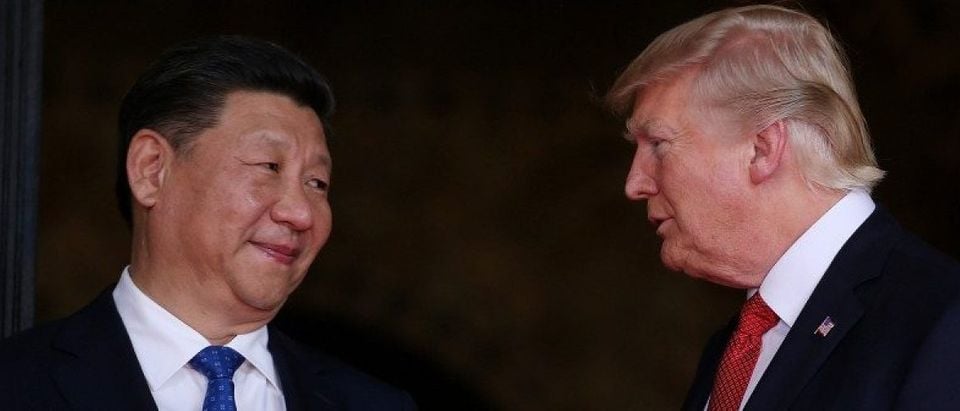The U.S. and China are not seeing eye to eye, as a number of issues that affected the bilateral relationship in the past resurface.
Beijing expressed anger Friday over the Trump administration’s approval of a $1.42-billion arms sale to Taiwan.
“The Chinese government and Chinese people have every right to be outraged,” the Chinese embassy in Washington said. China is also steaming after the Department of the Treasury sanctioned a Chinese bank accused of laundering money for North Korea. The Chinese foreign ministry, which has repeatedly criticized the U.S. for extending the long arm of the U.S. legal system into other countries, urged the U.S. to “stop wrongful actions” that go “against the important spirit” of the meeting between Trump and Chinese President Xi Jinping in Mar-a-Lago in April.
Tariffs on steel, which China often dumps on other countries to the detriment of domestic industries, are expected to be coming down the pipeline, further complicating ties.
The president railed on China on the campaign trail, but he seemed to pull his punches after taking office, pinning his hopes of resolving the North Korean nuclear crisis on China. After meeting China’s president for the first time, Trump repeatedly praised Xi and spoke often of aspirations to build a friendship between Washington and Beijing.
I have great confidence that China will properly deal with North Korea. If they are unable to do so, the U.S., with its allies, will! U.S.A.
— Donald J. Trump (@realDonaldTrump) April 13, 2017
In Mar-a-Lago, China and the U.S. discussed improved trade relations and opportunities to stop North Korea from developing increasingly powerful weapons to threaten other countries in the international community.
That confidence appeared to fade recently, as Trump sent out another tweet after the death of an American college student detained in North Korea suggesting that China had tried and failed to reign in its neighbor and ally.
While I greatly appreciate the efforts of President Xi & China to help with North Korea, it has not worked out. At least I know China tried!
— Donald J. Trump (@realDonaldTrump) June 20, 2017
In the White House, there are questions about how hard China has tried to resolve the situation. While Beijing has clamped down on North Korean coal imports, it is clear that more could be done to pressure Pyongyang. “China is still falling far short of what it could bring to bear on North Korea in terms of pressure,” a senior White House official explained to reporters Wednesday, “Coal is only one component of that. We very much want to see China do more than it’s willing to do, while we do recognize that China is doing more than it has done in the past.”
China is tied to roughly 90 percent of all North Korean trade, giving Beijing a certain degree of leverage over the regime.
Despite agreements to cooperate on North Korea, Washington and Beijing are pursuing different approaches. While the Trump administration is implementing a strategy of “maximum pressure and engagement” focused on pressure North Korea through diplomatic and economic pressure, China is calling for a decrease in U.S. military activities in Korea in exchange for a freeze on North Korean nuclear and missile testing. Beijing also continues to push for dialogue, as Washington counters that now is not the time for talks.
Another point of contention on the Korean peninsula is the deployment of a Terminal High Altitude Area Defense (THAAD) anti-missile system in South Korea. China considers the development of a regional missile shield an attempt by the U.S. to negatively impact China and Russia’s respective nuclear deterrence strategies and shift the balance of power in the Pacific. “We have said many times before that the United States deployment of THAAD not only is not beneficial for the resolution of the Korean Peninsula nuclear issue, it is also not good for regional stability,” the Chinese foreign ministry said earlier this month, adding that China and Russia intend to continuously oppose the deployment.
Further impairing bilateral cooperation, the Trump administration conducted its first freedom-of-navigation operation in the South China Sea in late May. The Chinese military has been increasing its presence in both the Spratly Islands and Paracel Islands in recent months, attempting to change the status quo in the region though force and coercion.
China has also, as of late, intercepted U.S. aircraft in situations deemed “unsafe and unprofessional” by U.S. defense officials.
Issues related to North Korea, trade, regional militarization, territorial disputes in the East and South China Sea, and unplanned military encounters have derailed the U.S.-China bilateral relationship under past administrations. Despite the burst of positive rhetoric in the wake of the Mar-a-Lago meeting, it appears the relationship faces challenges as many of the unresolved problems of the past resurface.
Send tips to ryan@
Content created by The Daily Caller News Foundation is available without charge to any eligible news publisher that can provide a large audience. For licensing opportunities of our original content, please contact licensing@dailycallernewsfoundation.org.
All content created by the Daily Caller News Foundation, an independent and nonpartisan newswire service, is available without charge to any legitimate news publisher that can provide a large audience. All republished articles must include our logo, our reporter’s byline and their DCNF affiliation. For any questions about our guidelines or partnering with us, please contact licensing@dailycallernewsfoundation.org.


